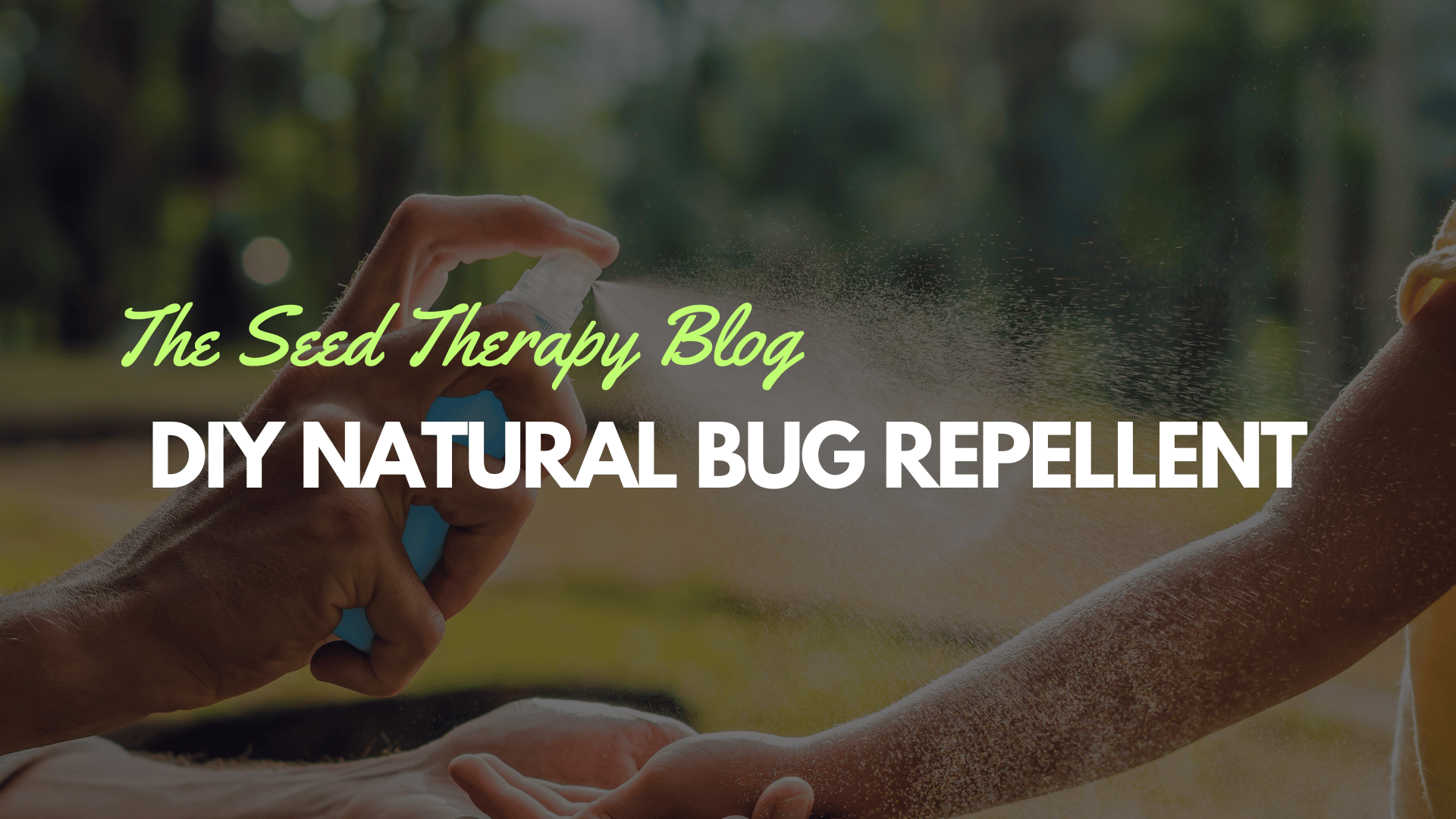By Ryan Dorn, SeedTherapy.com

Summer is truly a magical time, isn't it? Long, sun-drenched days, evenings perfect for lingering in the garden, and the promise of outdoor adventures. Yet, there's often one tiny detail that threatens to spoil the whole picture: the relentless buzz and bite of pesky insects! Mosquitoes, gnats, and other uninvited guests can quickly turn a peaceful moment into an itchy inconvenience. While plenty of commercial repellents are out there, many of us gardeners are always on the lookout for a natural, chemical-free way to protect ourselves and our loved ones.
Good news! Nature provides a powerful ally in the fight against summer bites: Lemon Balm (Melissa officinalis). This fragrant herb, known for its calming properties, also boasts impressive bug-repelling capabilities. And the best part? You can easily transform it into an effective, natural bug spray right in your own home.
In this guide, we'll dive into why lemon balm is your summer secret weapon. We'll share a simple, step-by-step recipe for an amazing homemade lemon balm bug repellent, so you can enjoy your outdoor activities without the worry of harmful chemicals. Get ready to embrace natural protection and reclaim your summer evenings!
Why Lemon Balm Works as a Natural Bug Deterrent 🌿
Lemon balm (Melissa officinalis) isn't just a delightful herb for calming the nerves; it's also a powerhouse when it comes to keeping pesky bugs away. While a bug repellent might not immediately pop into your head as a "medicinal remedy," focusing on natural solutions allows us to remove harmful chemicals from our lives. Like they say, "an ounce of prevention is worth a pound of cure."

The secret to lemon balm's effectiveness as a bug deterrent lies in its aromatic compounds. It’s a member of the mint family, and like many of its relatives, it produces a strong, pleasant scent that humans love, but insects, particularly mosquitoes, find unappealing. This herb is rich in lemon-scented essential oils and is high in a compound called citronellal, which create a natural barrier against common summer nuisances.
Using lemon balm for bug repellent is a fantastic way to tap into nature’s pharmacy, offering a safe and effective alternative for enjoying your outdoor spaces.
How to Grow Your Own Lemon Balm 🌿
Having fresh lemon balm on hand makes crafting your own bug spray and other remedies a breeze! Fortunately, this fragrant herb is a joy to grow and relatively low-maintenance once established.
- Type: Lemon balm is a perennial, meaning it will return year after year.
- USDA Zones: It thrives in USDA Zones 3-10.
- Light: Lemon balm prefers full sun to partial shade.
- Seed Depth: When planting, sow seeds on the surface. It's crucial not to cover the seeds, as they need light to germinate. Gently tamp them down for good soil contact.
- Sowing Rate & Spacing: Aim for about 1 seed per inch. Once seedlings emerge, thin them to the strongest seedling every 12 inches, with rows 18-24 inches apart.
- Starting Indoors: To maximize your growing season, you can start lemon balm seeds indoors about 6 weeks before the final spring frost. Transplant them outdoors after all frost dangers have passed and seedlings have developed their second set of true leaves.
- Direct Sowing: For areas with long growing seasons, you can direct sow the seeds in a prepared soil bed after all threats of frost have passed.
- Germination Time: You can expect to see sprouts within 7-21 days on average.
Growing your own lemon balm ensures a fresh, abundant supply for your natural bug repellent and all its other wonderful uses! Ready to start your own lemon balm patch? You can always find amazing lemon balm seeds right here at Seed Therapy to kickstart your natural wellness journey.
Your DIY Lemon Balm Bug Repellent Recipe 🌿
Now for the fun part – crafting your very own lemon balm bug repellent! This recipe is straightforward and uses natural ingredients to create an effective shield against summer's buzzing annoyances.
What You'll Need:
- 1/2 Cup dried lemon balm
- 4 ounces Witch Hazel Extract (carried at most grocery stores, or grow your own with our Witch Hazel seeds!)
- 3 drops lemongrass essential oil
- 1 drop basil essential oil
- 2-3 drops orange essential oil
- 4 ounces distilled water
- A sealable mason jar or container (to create the infused oil)
- A small spray bottle
- Muslin cloth (for straining)
Step-by-Step Instructions:
First, Make Your Lemon Balm Infusion:
To create an infused oil (also known as an extraction or infusion), dried herbs are steeped over time in a liquid base to slowly draw out their beneficial properties. This process is often called "digestion" because of how gradually the medicinal agents are derived from the herbs. It's crucial to use dried herbs for this process; fresh herbs contain water, which can quickly cause an infusion to spoil or become rancid. For this lemon balm bug repellent, we're using Witch Hazel extract as our liquid base. Witch hazel is ideal for this kind of topical remedy because it's soothing, lightly astringent, and helps preserve the infusion — plus it evaporates quickly, leaving skin feeling fresh rather than greasy.

- Combine dried lemon balm (1/2 cup) and the Witch Hazel Extract (4 oz.) into a mason jar or other sealable container you have around the house.
- Shake the mixture thoroughly to combine all ingredients.
- Place the jar in a cool, dark cabinet for a week or two to allow the lemon balm to infuse fully into the witch hazel extract. The longer you allow it to infuse, the more the lemon balm will infuse.
Next, Create Your Bug Repellent Spray:

- Once your lemon balm infusion is ready, you'll need to strain its contents. Pour the infusion into a bowl using a muslin cloth to strain the leaves from the liquid. Make sure to squeeze out as much infused liquid as possible.
- To this strained lemon balm infusion, add 3 drops of lemongrass essential oil, 1 drop of basil essential oil, and 2-3 drops of orange essential oil. All of these essential oils help as a mosquito repellant and add an amazing scent to the infused lemon balm oil.
- Stir the mixture well for 30-60 seconds to ensure the essential oils are thoroughly incorporated.
- Fill your spray bottle halfway with this concentrated mixture.
- Fill the rest of the spray bottle to the top with distilled water and cap it.
- Store your homemade lemon balm bug repellent in the refrigerator and shake well before each use.
How to Use Your Natural Repellent:
Apply your lemon balm bug repellent every 1-2 hours, or as needed, to combat mosquitoes and other annoying bugs. This spray is intended for human use and is not designed for pets.
Beyond Bug Spray: Other Wonderful Lemon Balm Recipes
Lemon balm's versatility extends far beyond just bug repellent! The same amazing herb that keeps mosquitoes at bay can be used in a variety of other simple, natural recipes to support your well-being. Here are a few more ways to enjoy your lemon balm harvest:
1. Lemon Balm Tea ☕
A soothing cup of lemon balm tea can help calm the mind and body.

Ingredients:
- 1/4 cup fresh lemon balm leaves, chopped (or 1/8 cup if using dried lemon balm)
- 1 cup water
- 1 teaspoon raw honey (optional)
How to Make:
- Chop the lemon balm leaves to release their oils and set aside.
- Heat the water in a cup in the microwave or on the stove until boiling.
- Mix the leaves and water in a mug and allow to steep for 10 minutes.
- Stir in honey and strain if desired. Drink warm.
Usage: Enjoy as needed for its calming and beneficial properties. Generally, consume lemon balm tea for no more than 4-6 weeks consecutively, followed by a short break.
2. Lemon Balm Cold Sore Balm 🩹
Lemon balm's antiviral properties make it a great choice for soothing cold sores.

Ingredients:
- 3 Tbsp beeswax
- 3 Tbsp coconut oil
- 1 Tbsp aloe vera gel (store-bought is fine)
- 12 drops lemon balm essential oil
- 3 drops vitamin E
- Tins or containers with sealable lids
How to Make:
- In a small pot or double boiler, melt beeswax, coconut oil, and vitamin E together on low heat.
- Remove from heat and add the aloe gel and lemon balm essential oil, stirring well.
- Immediately pour into storage tins or sealable jars.
- Let cool on the counter until hard, then cover.
Usage: Apply a very small amount on lips as needed. Avoid during pregnancy, lactation, and with very small children. Avoid with hypersensitive skin. Discontinue use if condition worsens or there is added irritation. Avoid sharing lip balm with others to prevent the spread of the virus that causes cold sores.
3. Ginger & Lemon Balm Syrup 🍯
This comforting syrup can help provide relief for minor symptoms of cold or flu.

Ingredients:
- 1/4 cup chopped, fresh lemon balm leaves (or 1/8 cup dried lemon balm)
- 2 inch ginger root, chopped and peeled
- 1/3 cup simmering hot water
- 1 tbsp lemon juice
- 1/4 cup raw honey
How to Make:
- Place the chopped lemon balm leaves and ginger root into a heatproof 8 oz (half-pint) canning jar.
- Pour the simmering hot water over the herbs, cover with a saucer, and let steep for around an hour. Strain the resulting tea.
- Pour the 1 tablespoon of fresh lemon juice into a 1/4 measuring cup and then fill it the rest of the way with strained lemon balm/ginger tea. (If you're allergic or can't use lemon juice, just omit it and use more tea in its place.)
- Combine the tea & lemon juice combination with 1/4 cup of raw honey and stir well.
- Cap, label, and store the finished honey in your refrigerator for around 2 weeks. Stir before each use.
Usage: Take by the spoonful, as needed, for relief of minor symptoms of cold or flu. If you have chronic medical problems, are pregnant or nursing, have worsening symptoms, or feel concerned about your illness, always check with your doctor or health care provider for their professional and personalized advice.
Important Warnings and Considerations ⚠️
While lemon balm is generally considered extremely safe and is one of the most popular herbal ingredients for teas, it would be irresponsible for us not to include the potential risks. While I feel it's important to learn about medicinal plants and to carry on the lineage of those that came before us, having the knowledge of when not to use something is every bit as important as knowing what a plant can be used for.

- Potential Side Effects: Though rare, lemon balm has the potential to cause side effects in some individuals. These may include headache, nausea, vomiting, stomach pain, dizziness, wheezing, skin irritation, and allergic reactions. If you experience any adverse reactions, discontinue use.
- Contraindications: Please seek the advice of a physician if you have certain medical conditions or are taking specific medications. This includes individuals with glaucoma, thyroid issues, or those taking barbiturates, sedatives, or drugs that affect serotonins.
- Pregnancy, Nursing & Children Under Two: Always consult a physician or qualified healthcare provider before using any herbal remedies, including lemon balm.
- General Guidance: This repellent is intended for human use and is not designed for pets. If you have chronic health issues or concerns, please seek professional guidance from a qualified professional for personalized advice. The information provided is for educational purposes and is not a substitute for professional medical advice.
Always remember, an ounce of prevention in understanding and responsible use is worth a pound of cure. By being mindful of these considerations, you can enjoy your homemade lemon balm bug repellent safely and effectively.
Conclusion: Embrace Natural Protection for Summer Fun!
Making your own lemon balm bug repellent is a fantastic way to enjoy the great outdoors this summer without relying on harsh chemicals. As you've seen, lemon balm isn't just a pleasant-smelling herb; it's a powerful natural deterrent against pesky bugs, and a versatile plant with many other wellness benefits.
By taking a little time to prepare this simple, homemade spray, you're choosing a safe and effective alternative for yourself and your family. It's about empowering yourself with nature's solutions and reclaiming those enjoyable summer evenings.
Remember to always use your homemade repellent mindfully, following the usage guidelines and paying attention to any personal sensitivities or medical conditions. While learning to use medicinal herbs is important, understanding when not to use them is equally important. If you have any health concerns or are pregnant or nursing, always consult a qualified professional before using any new remedies.
So, go ahead and cultivate some lemon balm, whip up your own batch of bug spray, and step outside with confidence. Get ready to embrace natural protection and make the most of your summer garden adventures!


















































